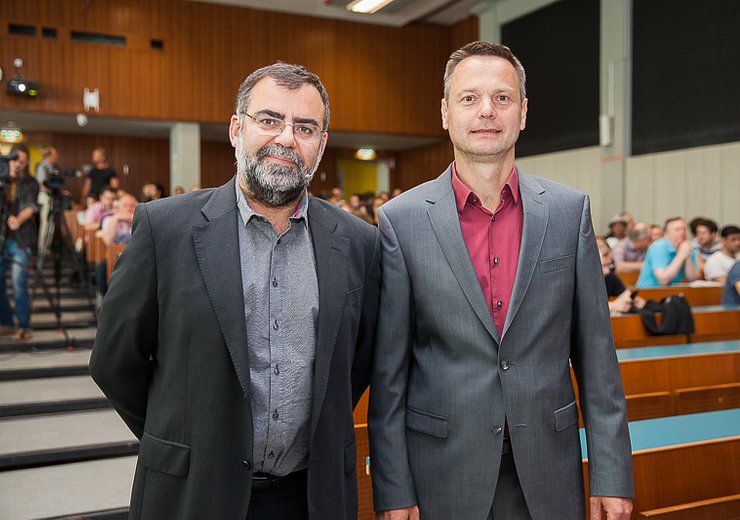“Bias in the Web”
Search technology expert Ricardo Baeza-Yates explains the many types and mechanisms of inclination and how to break the “vicious circle of bias”.

Picture: Nadja Meister / TU Wien Informatics
About
Ricardo Baeza-Yates is a Chilean-Spanish computer scientist and currently CTO of NTENT, a semantic search company in Carlsbad, California. He is also Director of Graduate Data Science Programs (part-time) of Northeastern University, Silicon Valley campus. Until February 2016, he was VP of Research for Yahoo! Labs. His research interests include algorithms and data structures, information retrieval, web search, data mining, and data science and visualization.
When we quickly reach for a chocolate bar at the cash desk, chase after our wishes in online shops, or scroll through the latest news videos, we don’t leave a free hand to chance. Both online and offline, others decide what we see and don’t see, what kind of products are offered to us, and which information remains hidden. In technical language, this is called presentation bias. For search technology expert and former Head of Research at Yahoo Labs Ricardo Baeza-Yates this is just the tip of an iceberg that we like to overlook when surfing the net every day.
A Matter of Attitude
“Bias is not wrong by definition,” explains Ricardo Baeza-Yates. It is not an invention of the Internet either. Bias and prejudice are all over the place where people communicate. Whether economic, cultural, gender-specific or demographic - we are confronted with “biased data” on a daily basis. As this year’s speaker of the Vienna Gödel Lecture, however, Baeza-Yates wants to raise awareness of the topic. The Web as a “mirror of society” brings a new dynamic into play: erroneous data or radical opinions are spreading rapidly. “Today, fake news can reach the whole world in a short period of time, whereas in the past, it might not have gotten beyond the regulars’ table,” says Baeza-Yates.
How Does the Filter Bubble Burst?
At present, it is mainly up to the users themselves whether they try to consume the broadest possible range of information on the Web and find ways out of the filter bubble. With his search technology company NTENT, however, Baeza-Yates is currently also researching technological approaches on how a better balance of opposing opinions can be achieved, and what role search engines play in this.
The algorithm expert differentiates between data bias and process bias. While the former deals with the human influence on data, the process bias deals with system-related errors. For example, algorithms produce new data non-stop. If these rules of action follow wrong assumptions, they reinforce and propagate them all the more.
What is normal?
Another aspect is the so-called activity bias. In democracies, what is normal is usually determined by majorities. Short message platforms like Twitter presented a distorted picture of the majority, as only about two percent of all accounts were actually tweeting actively, according to Baeza-Yates. He describes this as “tyranny of the minority” and appeals to passive readers: “If you don’t write, you can’t complain afterwards.“ Many sources of information on the Internet are also dominated by men. On editorial pages as well as in reference works such as Wikipedia, male majorities continue to decide which knowledge is passed on, the Gödel speaker criticizes (keyword: gender bias). He, therefore, calls on developers and users to consider the many types and mechanisms of bias and to break the “vicious circle of bias” together.
Downloads
-
PDF / 2.63 MB / Bias-in-the-Web-short.compressed.pdf
Links
- Vienna Gödel Lecture 2017 on YouTube
- DER STANDARD “Das Internet ist ein lebendes Organ“
- Futurezone “Wir können ein besseres Internet aufbauen“
- FM4 “Bias in the Web“
Curious about our other news? Subscribe to our news feed, calendar, or newsletter, or follow us on social media.







